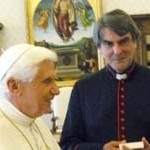
The Anglican Centre was established just after the conclusion of Vatican II to be a permanent place of dialogue and relationship between the global Anglican Communion and the Catholic Church. It remains committed to this purpose today thus during the recent Synod of Bishops on the New Evangelization the Centre included a visit from Archbishop Rowan Williams. Archbishop Williams spoke to the Catholic Synod as one of many Protestant guests.
Williams noted, in his address to the Synod: “The Council was, in so many ways, a rediscovery of evangelistic concern and passion, focused not only on the renewal of the Church’s own life but on its credibility in the world. . . . Evangelization, old or new, must be rooted in a profound confidence that we have a distinctive human destiny to show and share with the world. Evangelization is always an overflow of something else–the disciple’s journey to maturity in Christ, a journey not organized by the ambitious ego but the result of the prompting and drawing of the Spirit in us.”
Williams further told the synod that being converted to the Christian faith does not mean to simply acquire a new set of beliefs, but to become a new person. This new person is in communion with God and others through Jesus Christ. Williams expressed one of my specific passions for ACT 3 when he said to the bishops: “Wherever initiatives are being taken to reach out in new ways to a lapsed Christian or post-Christian public, there should be serious work done on how such outreach can be grounded in some ecumenically shared contemplative practice.” Williams referenced the work of communities like Bose, Taize and the world Community for Christian Meditation as well as “the great spiritual networks, Saint Egidio, the Focolare and Comunione e Liberazone.”
As I said above this last quotation underscores a deep passion of my own. By networking with the Focolare, in particular, I have seen how communities who share in a contemplative practice can model evangelism and compassion in a Christocentric way that honors ecumenism and seeks to share the love of God out of community life lived in the Spirit. I look forward to sharing more in the fellowship of Focolare in the days ahead and I will share more of this journey with you as I do. I received today an invitation to speak for a January 2013 Focolare gathering for prayer. I was pleased to accept this kind offer to preach.
If you had asked me five years ago if I imagined myself sharing in this kind of life and friendship I would have looked at you with utter incredulity. I didn’t even know such communities existed, much less that I would be sharing life with them in Christ. If I have learned anything in the last decade of my life it is this–remain open to the leading of the Spirit of God, put your roots down deep into the active love of Christ, build contemplative prayer and practice into your routines and move forward. God will guide you and use you.
Related Posts
Comments
Comments are closed.
My Latest Book!

Use Promo code UNITY for 40% discount!






Ben Currin liked this on Facebook.